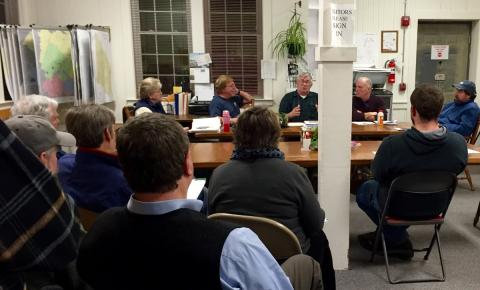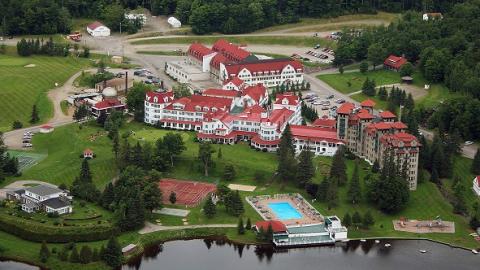In the Town That Votes First, A Push To Keep Resort Benefits Local

In 2011, the historic Balsams Resort shut its doors after more than a hundred years operating in the tiny town of Dixville Notch in New Hampshire’s White Mountains. With the closure, hundreds of North Country citizens lost their jobs, and the town, which had become well known for being one of the first places to cast ballots in the state’s presidential primary — at midnight at the resort — found a beloved tradition in jeopardy.

Now there are plans for the resort to undergo a significant renovation and expansion in the coming years. The plans include a new wing, upgrades to the once world-class golf course and the addition of 1,000 additional acres to the ski area, which would make it the largest downhill ski area in the Northeast.
With assistance from UNH Cooperative Extension, North Country residents are working to fully understand what the proposed redevelopment of the iconic resort could mean for their part of the state.
Although future revitalization of the resort is largely viewed as a positive for the towns and unincorporated areas in this northernmost part of the New Hampshire, some residents have raised concerns that it could negatively impact local businesses, which are already dealing with workforce challenges associated with the ongoing exodus of younger residents.
These concerns have attracted the attention of North Country leaders, who last spring sought Extension’s help in answering some difficult questions about the potential impacts. Since June 2015, Extension’s community and economic development team has been working with these regional leaders to help them understand what challenges the renovation might pose as well as the opportunities it could bring for local businesses and residents.
At a recent economic development planning session led by Extension, one participant asked what may be the million-dollar question: “How can we ensure that whatever happens at the Balsams benefits those of us who already live here?”
Lessons from Burke, Vermont
Many rural towns across the United States have opened their doors to large resorts. While this has provided an economic boost, a common complaint of local residents and business owners is the lack of sharing in the benefits generated by the resort. Further, municipalities often bear costs of resort development, such as increased traffic, strains on sewer and water infrastructure, skyrocketing housing prices and difficulties faced by local businesses when workers leave to fill sometimes higher-paying resort positions.
“The goal of this resort is to provide a self-contained, full-service experience for guests. That is how they make money, and you need to understand that,” said Gloria Bruce, director of the Northeast Kingdom Travel and Tourism Association in Vermont. However, Bruce added, “Even people visiting all-inclusive resorts will want to explore the local culture and attributes that make the surrounding area special. That is an opportunity for local entrepreneurs."
Bruce made the remarks at a joint meeting of leaders and economic development stakeholders from New Hampshire’s North Country and Vermont’s Northeast Kingdom held in Burke, Vermont, recently. USDA Rural Development and UNH Cooperative Extension organized the meeting with the purpose of giving North Country leaders an opportunity to learn from the experiences of Burke, which is undergoing an expansion of Q Burke Mountain Resort.
Bruce said local businesses must understand who their potential customers are and what types of products and services they want.
“You wouldn’t try to sell a rabbit-ear television to someone who has digital TV, would you?” she asked.
An opportunity to plan ahead
A key takeaway from the meeting was this: To share in the benefits of resort tourism, community, business and economic leaders must plan ahead, establish a common vision and support policies and investments that minimize negative impacts and capitalize on economic opportunities.
Investments could include programs through local chambers of commerce and other support organizations that help local businesses understand the changing demographics, identify their niche and sell to new markets. Workforce development could be another focus, and one meeting participant suggested that regional vocational and technical institutions have an important role to play.
“Contrary to what many people think, some of the jobs that resorts bring pay well,” Bruce noted. “But those jobs require a specific set of skills.”
Members of the Burke Selectboard were cautious when asked about the impacts of the redevelopment of Q Burke, having witnessed similar expansions and upgrades throughout the ski resort’s history.
“We hope that the town benefits from the redevelopment, but we’ll have to wait and see,” cautioned Selectboard member Kenneth Sanderson.
Burke representatives noted that a few downtown businesses have benefited from the redevelopment but acknowledged it remains to be seen how plumbers, electricians and carpenters will benefit, as resorts commonly bring in tradespersons from outside the local community to do those jobs.
Moving forward with renewed optimism
Leaders from the Greater Colebrook Region and Burke agreed that change is both hard and often met with resistance. But those in the Granite State are determined to make the best of it. A group of business and municipal stakeholders from the North County will meet again on Feb. 20 at a regional summit coordinated with help from UNH Extension. Extension specialist Molly Donovan will facilitate with help from Extension specialists Geoff Sewake, Brendan Prusik, and Sarah Smith. The goal is to identify specific ways the region may capitalize on the Balsams redevelopment and energize and empower local leaders.
As one North Country leader noted, “We say we want economic development, but we don’t want change. The truth is, our region has always changed. The Balsams is coming, and what we do to capitalize on it is entirely in our hands.”
The Balsams’ developers have already restored one point of pride to the residents of Dixville Notch: On February 9, they will once again be the first in the nation to cast their primary votes.